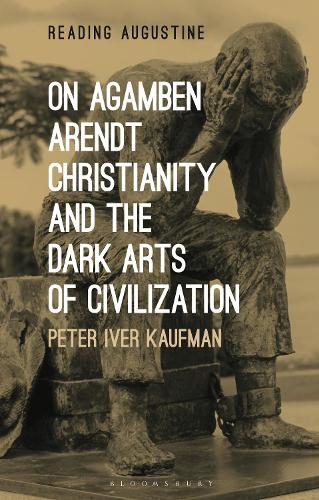
On Agamben, Arendt, Christianity, and the Dark Arts of Civilization
(Paperback)
Publishing Details
On Agamben, Arendt, Christianity, and the Dark Arts of Civilization
By (Author) Dr Peter Iver Kaufman
Bloomsbury Publishing PLC
Bloomsbury Academic
17th October 2019
United Kingdom
Classifications
Tertiary Education
Non Fiction
Ethics and moral philosophy
Christianity
Theology
261.7
Physical Properties
Paperback
168
Width 136mm, Height 214mm, Spine 14mm
240g
Description
Many progressives have found passages in Augustines work that suggest he entertained hopes for meaningful political melioration in his time. They also propose that his political theology could be an especially valuable resource for an ethics of democratic citizenship or for hopeful citizenship in our times. Peter Kaufman argues that Augustines political theology offers a compelling, radical alternative to progressive politics. He chronicles Augustines experiments with alternative polities, and pairs Augustines criticisms of political culture with those of Giorgio Agamben and Hannah Arendt. This book argues that the perspectives of pilgrims (Augustine), refugees (Agamben), and pariahs (Arendt) are better staging areas than the perspectives and virtues associated with citizenshipand better for activists interested in genuine political innovation rather than renovation. Kaufman revises the political legacy of Augustine, aiming to influence interdisciplinary conversations among scholars of late antiquity and twenty-first century political theorists, ethicists, and practitioners.
Reviews
Kaufman presents a rich, dense amount of quality content and context. I found new illuminating insights, quotations, and cross-references on most pages. * Reading Religion *
Peter Kaufman is one of our most venerable interpreters of Augustines political thought. In this creative volume, he continues his quarrel with Augustines optimists through a series of illuminating and provocative forays into Agamben and Arendt. Kaufmans communitarian alternative may be the antidote we need for these cynical and lonely times. * Gregory W. Lee, Associate Professor of Theology and Urban Studies, Wheaton College, USA *
In a creative juxtaposition that leverages Augustines political theology for both modern and postmodern critiques of citizenship and sovereignty, Kaufman has managed to locate in the early Christian monastic movement some paradigms of countercultural identity formation in the figure of the practicing Christian who lives as a pilgrim, exile, and other. Augustine is here interpreted as a theologian whose early, short-lived fantasy of an alternative community at Cassiacum left an indelible imprint on his imagination, even as he became a central figure in the shaping and definition of what Christian conformity should look like. This is a study that will challenge many assumptions of patristic scholars, one that recuperates Augustine as a thinker who can be placed in a critical tradition of resistance and non-conformity. * W. Scott Blanchard, Professor of English, Misericordia University, USA *
This volume is a great addition to the series, Reading Augustine edited by Miles Hollingworth ... The genius of this book lies in its invitational style. It forces nothing on Augustine, and does not force Augustine on anyone. * Augustiniana *
Author Bio
Peter Iver Kaufman is Professor Emeritus at the University of North Carolina, Chapel Hill, USA, and holds the George Matthews and Virginia Brinkley Modlin Chair in Leadership Studies at the University of Richmond, USA.
